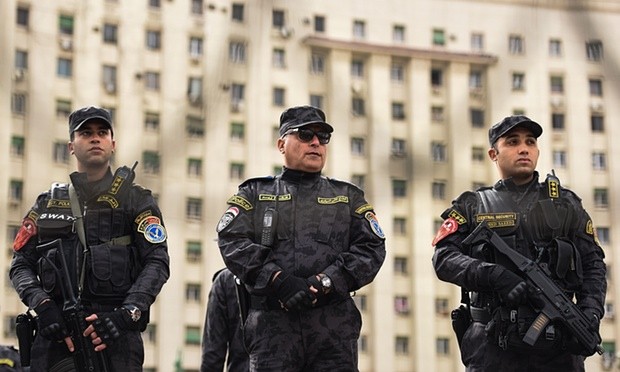Egypt’s revolution: The Guardian view

The Guardian
It would be easy to characterise the Egyptian revolution, the fifth anniversary of which came round on Monday, as simply a story of high hopes followed by deep disappointment. Five years ago Tahrir Square was alive with demonstrators, now it is just a dismal gated roundabout with a flag post in the middle, and the men and women who were out on the streets in those joyful times are staying home. Some support President Abdel Fatah al-Sisi and for most of those who do not, the price of open protest has become too high. It brings prison or worse.
Yet the actions of the regime suggest that the idea that the revolution has been defeated is wrong. President Sisi’s government rules by and through fear. It rules by fear because it mistreats and brutalises even its mildest critics. It rules through fear because it continues to derive legitimacy from the genuine anxieties felt by many Egyptians when the government of Mohamed Morsi seemed to be lurching toward its own Islamist version of authoritarian rule.
But it is also deeply fearful itself. Why else would it have expended so much effort raiding cultural centres, clubs and private houses in the run-up to the anniversary, unearthing very few armed opponents, but disrupting the lives of people who may be critical of the government but pose no real threat? Why else would it be making arrests and putting people in detention at a rate that one veteran journalist has argued represents the worst state repression for decades? Worse than under Mubarak, or any of his predecessors? The answer in part is that the Sisi government must continually substantiate its own propaganda – the myth that Egypt is engaged in a huge war against terrorism and Islamist extremism that must be won at all costs, and which justifies all kinds of draconian measures. Egypt of course does have a terrorist problem, but it is one that the government both exaggerates and makes worse by its policies.
“The regime’s real fear is not of terrorists but that it will not be able to control a society deeply changed by 2011”
By conflating the whole range of its opponents into a single mass of terrorists, terrorist sympathisers, or, at best, those whose stupidity enables terrorism to grow, the regime is pursuing a course that is the opposite of the precisely targeted approach that brings the best results in these situations. It is also provoking counter-attacks from the real terrorists that strike at one of the remaining pillars of the Egyptian economy, international tourism.
But the suspicion must be that the regime’s real fear is not of terrorists but that it will not in the end be able to control a society deeply changed by the revolutionary experience of 2011 and fundamentally disinclined to put up for much longer with the rule of a small elite of military officers and their bureaucratic and business allies. The Guardian’s former Cairo correspondent Jack Shenker has chronicled in a new book some of the ways in which that changed society is asserting itself – not, for the moment, at the formal political level but in myriad grassroots ways. Thus few people voted in parliamentary elections last autumn, but rebellious farmers and workers, popular musicians, feminists and activist workers are making their own politics down below.
This may be too optimistic a view. But it cannot be denied that the Egyptian political model since Nasser – which is of an army-business elite, with some limited reform aspirations, demanding deference and obedience, running an economy that offers foreigners big profits and workers few rights, and supported by a numerous, heavy-handed and unaccountable police – is broken. It has sometimes had certain benign and paternal aspects, but they have been increasingly less evident as the years have gone by. And Egyptians have changed. A narrow opposition has broadened out. So the proper verdict on the Egyptian revolution, and on the counter-revolution that followed it, is that they are both still with us, and that the story is far from over.
How to submit an Op-Ed: Libyan Express accepts opinion articles on a wide range of topics. Submissions may be sent to oped@libyanexpress.com. Please include ‘Op-Ed’ in the subject line.
- Libya’s HCS invites applicants for key state roles - December 31, 2023
- UK calls on Iran to prevent escalation in Israel-Hamas conflict - November 05, 2023
- Libyan Interior Minister: Immigrant shelter costs a fortune - November 05, 2023


